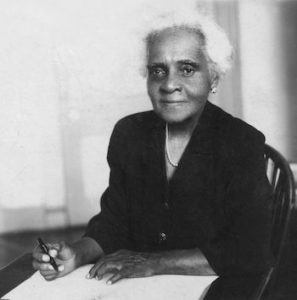
Adelaide Casely-Hayford
*Adelaide Casely-Hayford was born on this date in 1868. She was a Black African Creole cultural nationalist, educator, writer, and feminist.
Adelaide Smith was born to an elite family in Freetown, British Sierra Leone, to a mixed-race father (William Smith Jr, of English and royal Fanti parentage) from the Gold Coast and a Creole mother, Anne Spilsbury, of English, Jamaican Maroon, and Sierra Leone Liberated African ancestry. She was the second youngest of her parents' seven children. She and her sisters grew up mostly in England, where her father had retired in 1872 with his family.
She attended Jersey Ladies' College (now Jersey College for Girls). Like many other Sierra Leonean women born into the elite society, she was deeply influenced by Victorian values and ideas of family and gender roles. Casely-Hayford also traveled; during these travels, she became interested in Pan-Africanist politics. At 17, Smith went to Stuttgart, Germany, to study music at the Stuttgart Conservatory. She returned to England where, together with a sister, she opened a boarding home for Black African bachelors who were students or workers living in the country.
While in England, she married J. E. Casely Hayford. Their marriage may have given her a deeper insight into African culture and influenced her transformation into a cultural nationalist. In 1905, during one of her speeches, she emphasized the important role Black African women could play in social and political development; two years later, she returned to the Gold Coast (now Ghana). In 1914, her marriage ended in failure, and she returned to Sierra Leone. Casely-Hayford was committed to public service and worked to improve the conditions of Black men and women. As a pioneer of women's education in Sierra Leone, she played a key role in popularizing Pan-Africanist and feminist politics during the early 20th century.
She established the Girls' Vocational and Training School for Girls in 1923 in Freetown. Its purpose was to instill cultural and racial pride during the colonial years under British rule. Promoting the preservation of Sierra Leone's national identity and cultural heritage, in 1925, she made an impression by wearing a traditional African costume to attend a reception in honor of the Prince of Wales. She spent her later years writing her memoirs and short stories. Her short story "Mista Courier" was featured in Langston Hughes' African Treasury: Articles, Essays, Stories, Poems (1960), a collection of short works by African writers published in the United States.
Her daughter Gladys Casely-Hayford became a well-known Creole poet. As a feminist, she gave women the right to learn and speak for themselves, and persuaded mothers to raise their children in their home country, allowing them to be immersed in the culture they were born into. Adelaide Smith Casely Hayford, who paved the way for young girls in her home country to go to school and learn skills that they otherwise might not have been able to learn on their own, died in Freetown on January 24, 1960, aged 91.